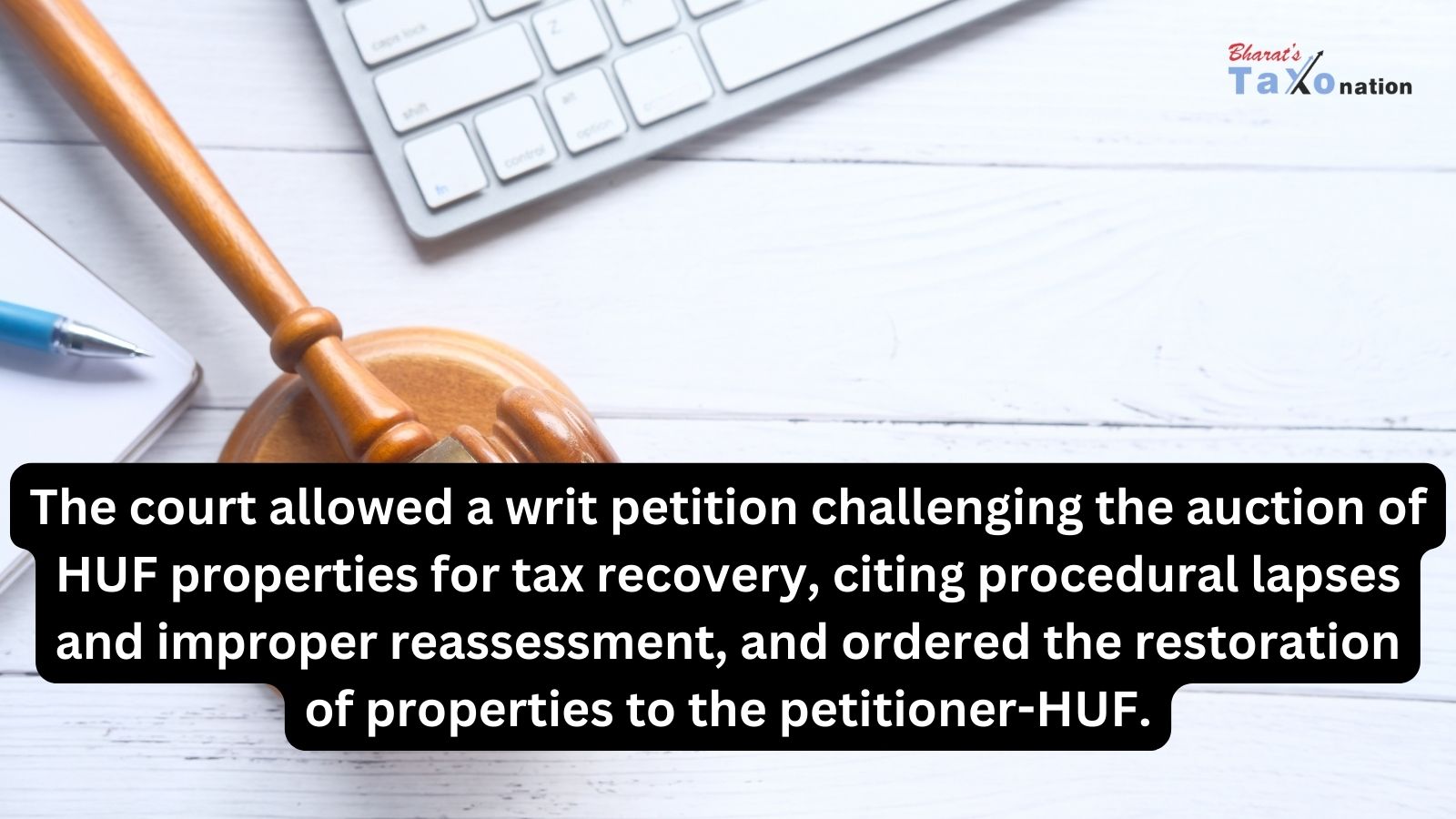
Background of the Case
A member of the Hindu Undivided Family (HUF) has filed a writ petition challenging the auction of properties owned by the HUF and its individual members. The auction was conducted by tax authorities to recover assessed taxes against the HUF. The petitioner contends that the auction is unlawful and seeks its cancellation.
Key Contentions by the Petitioner
Trust and Donation Background: The Rattan Trust, a non-charitable entity, was established via a registered deed on 28th March 1942. The trust received a donation of Rs. 5 lakh in January 1946 from Gokal Chand. The assessment for 1946-47 completed on 6th September 1946 included this donation.
Reopening of Assessment: Seventeen years later, the Income Tax Officer (ITO) reopened the assessment under Section 147 of the Income Tax Act, 1961. The reassessment concluded on 31st October 1964, increased the taxable income to Rs. 6,01,789, including the Rs. 5 lakh donation.
Appeal and Tribunal Decisions: The petitioner’s appeal against the reassessment was allowed by the Appellate Assistant Commissioner (AAC) on 27th July 1967. However, the Income Tax Appellate Tribunal (ITAT) initially dismissed the department’s appeal but later, an ex-parte order on 7th March 1979 upheld the assessment against the petitioner.
Subsequent Legal Proceedings: The ex-parte order was set aside on 29th April 1980 for rehearing. The ITAT’s subsequent order on 11th April 1983 upheld the reassessment. The Delhi High Court admitted the petitioner’s reference against this order.
Objections Against Recovery: The petitioner raised objections to the recovery notice and auction, citing procedural defects and asserting that payments made were not accounted for correctly. They argued that the amount in the recovery certificate was inflated, and the auction notice was issued prematurely.
Judicial Rulings and Outcome: The High Court eventually ruled in favor of the assessee on 15th May 2008, invalidating the reassessment and subsequent actions. The ITAT modified its order accordingly on 20th February 2009, upholding the AAC’s decision.
Legal Arguments and Issues
Authority and Jurisdiction: The petitioner contends that the Tax Recovery Officer (TRO) acted beyond their jurisdiction by not accounting for the payments made and by proceeding with the auction despite procedural flaws.
Violation of Rules: Several rules under the Income Tax Act’s Second Schedule were allegedly violated, including the lack of a reserve price in the auction proclamation and inadequate notice periods.
Principle of Lis Pendens: The petitioner argues that the auction should be void as it was conducted during the pendency of legal proceedings, invoking the doctrine of lis pendens under Section 52 of the Transfer of Property Act, 1882.
Rights of Auction Purchasers: The case also examines whether the auction purchasers, who were aware of the pending litigation, can claim bona fide purchaser status.
Court’s Analysis and Decision
Maintainability of the Writ Petition: The court held that the petitioner, as a member of the HUF, had the right to challenge the auction.
Assessment and Recovery Proceedings: The court found that the reassessment was reopened improperly and that the ex-parte order’s subsequent setting aside nullified the basis for the recovery notice and certificate.
Procedural Irregularities: The court noted several procedural lapses, including the TRO’s failure to revise the recovery certificate to account for payments made and the premature issuance of the auction proclamation.
Doctrine of Lis Pendens: The court upheld the doctrine, noting that actions taken during pending litigation were at the auction purchasers’ risk, and no equitable rights could be claimed by them.
Final Orders: The court directed the restoration of properties to the petitioner-HUF and declared subsequent transfers void. The tax authorities were ordered to refund the auction proceeds with interest.
Conclusion
The writ petition was allowed, highlighting the importance of following due process in tax recovery proceedings and ensuring that all procedural safeguards are respected. The case underscores the judiciary's role in protecting property rights and ensuring fairness in administrative actions.
Topic-Gokal Chand Rattan Chand versus Union of India
Citation- 2024 TAXONATION 173 (Punjab & Haryana)
CLICK HERE TO READ FULL CASE LAW
OR
Comment: